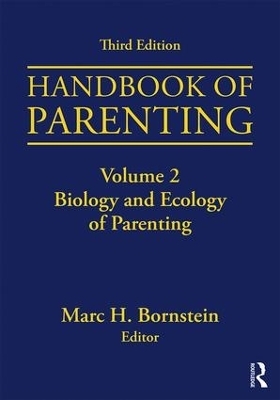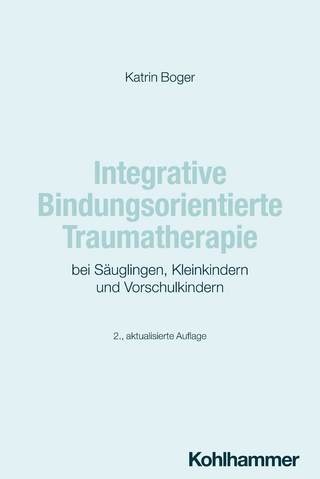
Handbook of Parenting
Routledge (Verlag)
978-1-138-22869-6 (ISBN)
This highly anticipated third edition of the Handbook of Parenting brings together an array of field-leading experts who have worked in different ways toward understanding the many diverse aspects of parenting. Contributors to the Handbook look to the most recent research and thinking to shed light on topics every parent, professional, and policymaker wonders about. Parenting is a perennially "hot" topic. After all, everyone who has ever lived has been parented, and the vast majority of people become parents themselves. No wonder bookstores house shelves of "how-to" parenting books, and magazine racks in pharmacies and airports overflow with periodicals that feature parenting advice. However, almost none of these is evidence-based. The Handbook of Parenting is. Period. Each chapter has been written to be read and absorbed in a single sitting, and includes historical considerations of the topic, a discussion of central issues and theory, a review of classical and modern research, and forecasts of future directions of theory and research. Together, the five volumes in the Handbook cover Children and Parenting, the Biology and Ecology of Parenting, Being and Becoming a Parent, Social Conditions and Applied Parenting, and the Practice of Parenting.
Volume 2, Biology and Ecology of Parenting, relates parenting to its biological roots and sets parenting in its ecological framework. Some aspects of parenting are influenced by the organic makeup of human beings, and the chapters in Part I, on the Biology of Parenting, examine the evolution of parenting, the psychobiological determinants of parenting in nonhumans, and primate parenting, as well as the genetic, prenatal, neuroendocrinological, and neurobiological bases of human parenting. A deep understanding of what it means to parent also depends on the ecologies in which parenting takes place. Beyond the nuclear family, parents are embedded in, influence, and are themselves affected by larger social systems. The chapters in Part II, on the Ecology of Parenting, examine the ancient and modern histories of parenting as well as epidemiology, neighborhoods, educational attainment, socioeconomic status, culture, and environment to provide an overarching relational developmental contextual systems perspective on parenting.
Marc H. Bornstein is Senior Investigator, Head of Child and Family Research, and Head of the Imaging and Behavioral Determinants of Development Affinity Group at the Eunice Kennedy Shriver National Institute of Child Health and Human Development. He holds a BA from Columbia College, MS and PhD degrees from Yale University, and honorary doctorates from the University of Padua and University of Trento. Bornstein is President of the Society for Research in Child Development and has held faculty positions at Princeton University and New York University as well as academic appointments in Munich, London, Paris, New York, Tokyo, Bamenda, Seoul, Trento, Santiago, Bristol, and Oxford. Bornstein is author of several children's books, videos, and puzzles in The Child's World and Baby Explorer series, Editor Emeritus of Child Development and founding Editor of Parenting: Science and Practice, and consultant for governments, foundations, universities, publishers, scientific journals, the media, and UNICEF. He has published widely in experimental, methodological, comparative, developmental, and cultural science as well as neuroscience, pediatrics, and aesthetics.
Part I: Biology of Parenting 1. The Evolution of Parenting and Evolutionary Approaches to Childrearing David F. Bjorklund and Alyson Myers 2. Psychobiology of Maternal Behavior in Nonhuman Mammals Aya Dudin, Patrick McGowan, Ruiyong Wu, Alison S. Fleming, and Ming Li 3. Parenting in Nonhuman Primates Kim A. Bard 4. Genetics and Parenting Amanda V. Broderick and Jenae M. Neiderhiser 5. Prenatal Parenting David A. Coall, Anna C. Callan, Julie Sartori, and James S. Chisholm 6. The Social Neuroendocrinology of Human Parenting Ruth Feldman 7. Neurobiology of Human Parenting Eloise A. Stark, Alan Stein, Katherine S. Young, Christine E. Parsons, and Morten L. Kringelbach Part II: Ecology of Parenting 8. Ancient History of Parenting Valerie French 9. Modern History of Parenting Peter Stearns 10. Epidemiology of Parenting Rebecca M. Pearson, Miguel Cordero, and Priya Rajyaguru 11. Neighborhoods and Parenting Elizabeth A. Shuey and Tama Leventhal 12. Parent Education Attainment and Parenting Pamela E. Davis-Kean, Sandra Tang, and Nicholas E. Waters 13. Socioeconomic Status and Parenting Erika Hoff and Brett Laursen 14. Culture and Parenting Xinyin Chen, Rui Fu, and Wai Ying Vivien Yiu 15. Environment and Parenting Robert H. Bradley
| Erscheinungsdatum | 07.03.2019 |
|---|---|
| Zusatzinfo | 5 Tables, black and white |
| Verlagsort | London |
| Sprache | englisch |
| Maße | 178 x 254 mm |
| Gewicht | 925 g |
| Themenwelt | Geisteswissenschaften ► Psychologie ► Familien- / Systemische Therapie |
| Medizin / Pharmazie ► Medizinische Fachgebiete ► Psychiatrie / Psychotherapie | |
| ISBN-10 | 1-138-22869-9 / 1138228699 |
| ISBN-13 | 978-1-138-22869-6 / 9781138228696 |
| Zustand | Neuware |
| Haben Sie eine Frage zum Produkt? |
aus dem Bereich


